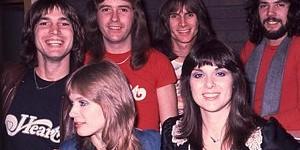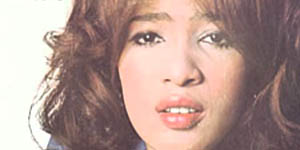The 100 Greatest Songs of the 1970s, Part II.
Oh, one more prefatory remark I’d meant to make last time. I’m listing the format the songs were originally released in, not where you can find them now. You’re all adults and can figure out how to use Allmusic, Amazon, iTunes, and Soulseek. Reissues come and go, but the original release is forever.
095. Heart “Crazy on You”
(Ann Wilson/Nancy Wilson)
Dreamboat Annie, 1976
I’ve heard this song called a Zeppelin rip-off (supposedly the line “let me go crazy, crazy on you” is derivative of “it’s been a lonely, lonely, lonely, lonely time.” Uh, okay, whatever), and more generally, Heart is dismissed by classic-rock chauvinists as a second-rate band with too many pop hooks and not enough instrumental wankage. Oh, and they probably have cooties. But if they’d only ever recorded the first two or three albums, they’d be considered legends by more people than their record company’s accountants — seriously, this is good freaking stuff. It helps, maybe, if you think of them as great 70s pop like Harry Nilsson and Fleetwood Mac, instead of as major album-rock artists going head to head with, I dunno, Rush or something. But they’re not just pop, either (although those hooks are killer, and a handful of their songs have achieved boomer-radio immortality); instrumentally, Nancy Wilson is as great a radio-friendly guitarist as there was in the 70s — as the classical-acoustic prelude to the song seems bound and determined to prove — and the dudes hold their own, especially the drummer. Ann, of course, has a great set of pipes, and if she doesn’t have the hair-raising immediacy of the best rock singers, she still manages to convince on both the Galadrielesque cod-mysticism of the verses and the snarling hunger of the choruses. Though there is one thing we can all agree on: they sucked in the 80s.
094. Lou Reed “Perfect Day”
(Lou Reed)
Transformer, 1972
This is how the indie-snob mindset works, for those who are curious: Lou Reed gets a free pass to write a sappy love song with big Broadway key changes and lyrics stolen fron Motown, because 1) he doesn’t sing on key all the way through, 2) he mentions (and mispronounces) sangria in the first few lines, and 3) he wrote “Heroin” and “Sister Ray.” Once you’ve made ears bleed, you’re allowed to do pop fluff, especially if it doesn’t sound quite like any other pop fluff out there. I like the song because it seems like such a direct contradiction of his hipster-asshole persona. And because of the aforementioned big Broadway key changes, which could be right out of a Sondheim show but with less witty and intelligent lyrics. Bowie’s production emphasizes the theatrical pomposity of it, undercut by Reed’s low-rent everyman voice. It’s not punk, and it’s only vaguely related to glam because Bowie and Ferry emphasize the theatrics in their music, and it’s only deeply personal in the way that the best pop music is, by being so universal that it applies perfectly to everyone’s life, so in that sense it’s not a typical Lou Reed song at all. But it’s not only the best song on Transformer (like most random hits, “Walk on the Wild Side” has dated badly), but it’s great, great pop music, and that’s why we’re here, after all.
093. Ronnie Spector “Try Some, Buy Some”
(George Harrison)
single, 1971
When David Bowie included a cover of this song on his 2003 album Reality, music reviewers fell all over themselves talking about how it was a tribute to the recently-dead George Harrison, thereby proving that they could read songwriting credits. Maybe one in every hundred knew about the original. George wrote and co-produced (with Phil Spector) this song for Ronnie as one of the fledgling singles on the Apple label, and the song bears the distinction of being the last time all four Beatles played on the same track until “Free As a Bird” (though they were never all in the studio at the same time). Which is nice trivia to have — and it certainly shows the esteem the then-Mrs. Spector was held in by the Fab Four — but the Bowie cover touches on something deeper: Ronnie, along with Dusty Springfield, was one of the patterning female icons of glam (see “Bennie and the Jets” for a direct tribute), and subsequently of gay culture. Her reading of the mysterious-as-usual lyric — is it about prostitution? spiritual awakening? yet another ode to Patti Boyd? — is full of the fragile dignity that camp icons from Bette to Judy to Barbra to Liza to Debra Messing incorporate. It’s taken at a stately pace, and the orchestral swoop and roar is a grand thing to behold; it failed as a single, naturally, and isn’t available on CD (although the 45 has recently been reissued). That’s nothing new; she’s made dozens of comebacks since, none of them successful commercially, but she remains one of the shining lights of twentieth-century music.
092. Sparks “This Town Ain’t Big Enough for Both of Us”
(Ron Mael)
Kimono My House, 1974
Might as well get this out of the way now: there is no Queen on this list. That’s because this song exists, and Queen is rendered unnecessary thereby. Okay, hyperbole; and of course I still bang my head to the last movement of “Bohemian Rhapsody.” But Russell Mael’s operatic falsetto completely destroys Freddie Mercury’s, and in this short glam-pop-metal-novelty song, they manage to hit every one of Queen’s marks: glorious riffage, classical melody played at a brisk rock & roll clip, wild Hollywoodesque imagery — everything except the massed choirs of Mercuries. Enough with the Queen-fan-baiting, though. Sparks were — are — a couple of brothers, Ron on keyboards and Russ on vocals. Back in the 70s, though, they had a full band, and this massive song takes full advantage of the fact, with cascading drums, winding guitars, and a muscular bassline that almost tricks you into thinking this pair of jokers is a serious stadium act. They could have been, if that was the kind of thing they were interested in; but they belong to the grand American tradition of restless eccentrics, and preferred to maintain their goofy, complex, rapid-fire sound rather than chase the crock of gold at the end of the pop-chart rainbow. Until new wave and synth-pop caught up with them in the 80s, that is; but that’s a story for another day.
091. The Wild Tchoupitoulas “Hey Pocky A-Way”
(Ziggy Modeliste/Art Neville/Leo Nocentelli/George Porter, Jr.)
The Wild Tchoupitoulas, 1976
As you might be able to tell from the songwriting credit, originally this was a Meters song. And it’s a great Meters song, one of the cold classics of New Orleans funk. This is not as muscular, or as funky — at least, and this is where language kind of lets you down, it’s not funky with the same overcharged stomp. It’s swampier, sultrier, slowed-down a trifle, with more tribal voudou and less R&B strut. The Wild Tchoupitoulas were — are, dammit — a Creole group whose main purpose is to celebrate Mardi Gras, a highly traditional collective, dressed in full faux-Indian regalia, that still uses music for its original purpose: to celebrate the here and now, a specific time and place for the people that can hear them from where they dance. With that mandate, it’s not surprising that they only made the one record (the surprise is that they made it at all), but it’s a slow-burn voodoo funk treasure — and the first time all the Neville brothers appeared on the same record at the same time. You can hear Aaron’s unmistakable voice, of course, but he also plays piano while Red and Art are on keyboards and Charles and Cyril on percussion. The rest of the Meters help out here and there, while the Tchoupitoulas themselves, led by Big Chief George Landry, sing and harmonize. This is the heart of New Orleans folk-jive.
Next: 090-085. >>

1 comment:
I believe that, since Rachel Sweet did not turn age 16 until 7-28-1978, she most likely was still only 15 years old when she left Akron, then recorded "Fool Around."
Post a Comment